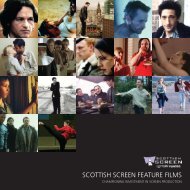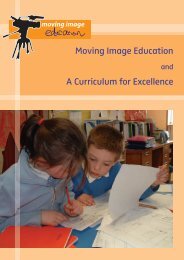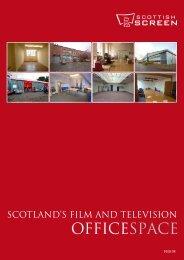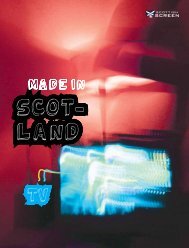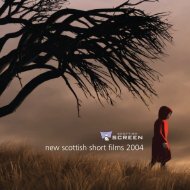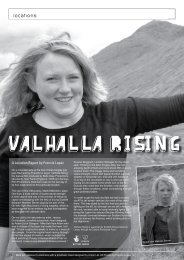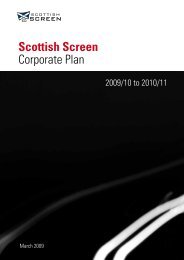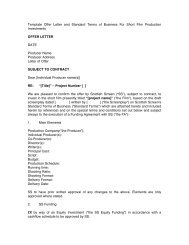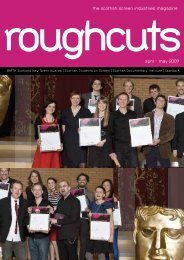Evaluation - Scottish Screen
Evaluation - Scottish Screen
Evaluation - Scottish Screen
You also want an ePaper? Increase the reach of your titles
YUMPU automatically turns print PDFs into web optimized ePapers that Google loves.
3.2 Design<br />
The literature reviews by Buckingham (2004) and Livingstone et al. (2004) suggest that<br />
longitudinal studies are required for proper evaluation of the impact of media literacy<br />
initiatives and this was taken into account in developing the methodology outlined below.<br />
Furthermore, both these reviews of the research literature suggest that rigorous research<br />
needs to move on from a simple account of how media literacy is being taught in schools<br />
towards a more thorough analysis of the impact of media education on students’ viewing and<br />
reading of media in their daily lives and again account was taken of this suggestion. As<br />
Livingstone et al. point out:<br />
Researching media literacy faces some serious challenges.<br />
Media literacy is concerned with people’s generally implicit,<br />
yet complex and subtle understanding of the media, and<br />
these are difficult to ask about directly. It may be concerned<br />
with things they cannot do or have not seen the importance of…<br />
(Livingstone et al., 2004, p56)<br />
Consequently, both Buckingham and Livingstone et al. question the efficacy of<br />
questionnaires and multiple-choice instruments in gathering the qualitative data necessary to<br />
meet the challenges just described. The preferred method indicated by both reviews is the<br />
use of focus groups. Within local authorities, however, the logistics of timetabled teaching<br />
can often present difficulty for teachers to gather together in one place in order to form focus<br />
groups. The evaluation team, therefore, were cognisant of the challenges presented by<br />
Buckingham and Livingstone et al. when constructing observation and interview schedules<br />
for teachers. Interview schedules were also constructed to ascertain lead practitioners’<br />
perspectives on the initiatives. Focus groups remained the preferred means of involving<br />
pupils and their parents in the evaluation. Observation of MIE classes, what lead<br />
practitioners, teachers and pupils actually did, was considered an appropriate method of<br />
triangulating what both groups said in interviews or focus groups.<br />
Moreover, in the early stages of any initiative, the specific detail required in an effective<br />
questionnaire may not yet be discernable to respondents. Therefore, to request data<br />
concerning the long-term incorporation of the knowledge gained in the programme into the<br />
classroom and curriculum could be asking teachers to reflect on something that has not yet<br />
happened or has only happened to a limited extent. It seemed more appropriate at this stage<br />
in the development of the initiative to ask teachers and their pupils to respond in three ways<br />
to their experiences so far. First, they were asked to reflect on their engagement with MIE<br />
both early in the project and at a substantially later stage; secondly to consider how this had<br />
impacted on their enjoyment and reading of media texts at both stages; and thirdly to project<br />
how what they learned through engagement with MIE could be used in the future in relation<br />
to media and media texts and also in relation to the wider environment. In designing our<br />
research in this way, our instruments paralleled the themes of the initiatives, namely learning,<br />
teaching and sustainable change.<br />
This methodology had three advantages. First, it responded directly to the immediate<br />
priorities of <strong>Scottish</strong> <strong>Screen</strong> (including positioning moving image education within the four<br />
capacities of A Curriculum for Excellence) and to those highlighted in the reviews of research<br />
literature. Second, it built on the basis for a longitudinal study created by evaluation of the<br />
Teacher Education Programme in session 2005 – 2006. The overriding concerns for the<br />
12




